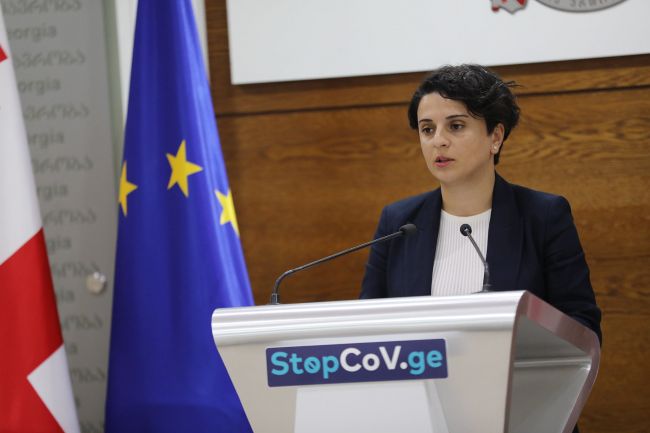2020-09-24
Lifting restrictions would naturally bring about enhanced mobility, which is why greater obligations will be placed on both the authorities and citizens in terms of compliance with rules, Head of the Government Administration Natia Mezvrishvili stated during a briefing following today's meeting of the Interagency Coordination Council at the Administration of the Government.
Natia Mezvrishvili emphasized that failure to comply with the rules is tied directly to the number of infection cases, and urged the public to be scrupulous about observing the rules.
"The Prime Minister was very clear and precise about the Government's consistent, rational, and predictable policy implemented since day against coronavirus. We said that, alongside lifting restrictions, the numbers of infection cases would grow, and that is the reality we are facing today. Lifting restrictions would naturally bring about enhanced mobility, which is why greater obligations will be placed on both the authorities and citizens in terms of compliance with rules. Failure to comply with the rules is tied directly to the number of infection cases. Consequently, we urge the public to be scrupulous about observe the rules. We are forced to live with the virus, and we are in the adaptation and management phase, preceded by the deterrence phase which sought to deter the virus and flatten the curve," Natia Mezvrishvili said.
The Head of the Government Administration also explained that, even though the number of identified cases is much higher than at the initial stage, no state of emergency is under consideration.
"Initially, we declared a state of emergency to get the system ready, to get more insight into the virus, reduce mobility, and this way flatten the curve. Global practice also proves our strategy right, because we have averted a considerable number of fatalities. People often ask what exactly we mean by readiness. Improved readiness means, firstly, sufficient medical supplies, retrained medical personnel, including the primary healthcare segment, also improvements across a variety of areas, such as hospital beds, among others. I will not go into detail. Nonetheless, we see that infection statistics are growing both in Georgia and worldwide, which is why we must be extra cautious. We have always said that the virus is still here. The public must understand that, until an effective global remedy against is in place, we must face today's reality and continue living in compliance with basic norms of hygiene," Natia Mezvrishvili emphasized.
The Head of the Government Administration pointed out the Government's consistent actions and added that the authorities continue taking consistent and targeted steps.
"Presently, we are in the adaptation and management phase, which encompasses several directions discussed previously by the Prime Minister. These are fast identification and flattening the curve, clinical management, and fast return to economic activities. Naturally, when we discuss quick identification and flattening the curve, we also mean that we are far more effective now in managing fever centers, the 112 service, intensive contact tracking, and isolation. We use quarantine as a means to flatten the curve. We carry out large-scale testing. Targeted testing is performed on symptomatic patients, and planned testing applies to high-risk groups, as we can see that the numbers are growing," Natia Mezvrishvili said.
The Head of the Government Administration also spoke about clinical management, emphasizing the success of the plan for managing milder cases at home and in quarantine zones.
"This system has been quite effective in Adjara, for example. It means that severe cases are treated in hospitals, relatively moderate cases at so-called COVID hotels, and milder cases at home with adequate conditions. When there are no adequate conditions, specialists decide who will be treated where. Clinical management throughout the country is implemented under overarching supervision and in line with the Health Ministry's protocol. Naturally, we may have some changes to clinical management, because we are expecting so-called seasonal flu which may catch up with this process, and there is nothing new about it," Natia Mezvrishvili stated.
According to the Head of the Government Administration, the third direction of the adaptation and management phase is very important in that it seeks to ensure fast return to life as usual.
"This means living with the virus, observing rules, learning more, and sharing experience. This is not the responsibility of the Government alone. It is also the responsibility of all citizens to observe basic rules, because the higher this responsibility is, the slower the spread of the virus is.
Naturally, the strengthening of the healthcare system continues in stages. To that end, we are carrying out preventive measures, and we are talking about prevention, we do not mean the country's total lockdown, as was the case in March and April, nor do we mean a state of emergency or a nationwide quarantine, one that we are presently imposing in Adjara, for instance. These measures are necessary to dispel any illusions about the health system having been overhauled over this period. Of course, these resources are not infinite, and we must be extra careful here, too," Natia Mezvrishvili said.
In discussing concrete decisions of the Interagency Coordination Council, Natia Mezvrishvili emphasized that, based on the current epidemiological situation in the Adjara Region, certain restrictions are in order.
"Starting tomorrow, September 25, restaurants in the Adjara Region will close at 10 PM, and all public transport will be suspended temporarily, for as long as it is necessary in light of the epidemiological situation. We will keep the public updated," Natia Mezvrishvili said.
The Head of the Government Administration also informed the public about the decision to resume in-class studies-Everywhere, where remote learning is presently adopted, with the exception of the Adjara Region, students of 1st through 6th grades will study in classes, effective October 1.
"This decision applies to Tbilisi, Kutaisi, Rustavi, and Zugdidi. As for Gori and Poti, in-class studies will resume in every grade starting October 1. Parents may choose a remote teaching model, which is very important. As for schools of higher education, remote studies will continue at this point," Natia Mezvrishvili said.
Press Service of the Government Administration












